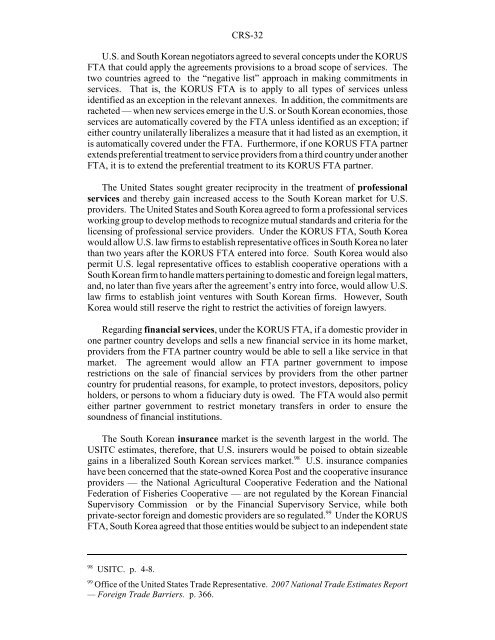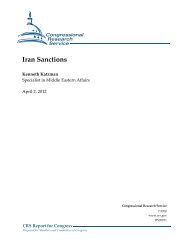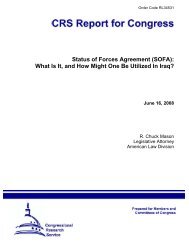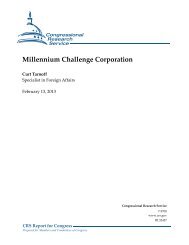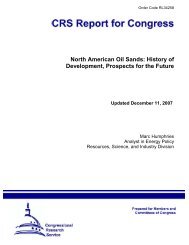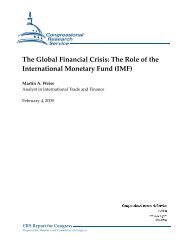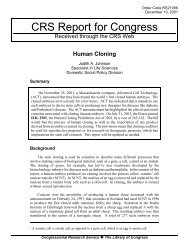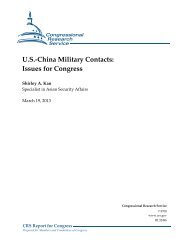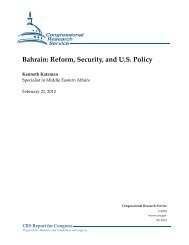The Proposed U.S.-South Korea Free Trade Agreement (KORUS ...
The Proposed U.S.-South Korea Free Trade Agreement (KORUS ...
The Proposed U.S.-South Korea Free Trade Agreement (KORUS ...
- TAGS
- korea
- fpc.state.gov
You also want an ePaper? Increase the reach of your titles
YUMPU automatically turns print PDFs into web optimized ePapers that Google loves.
98 USITC. p. 4-8.<br />
CRS-32<br />
U.S. and <strong>South</strong> <strong>Korea</strong>n negotiators agreed to several concepts under the <strong>KORUS</strong><br />
FTA that could apply the agreements provisions to a broad scope of services. <strong>The</strong><br />
two countries agreed to the “negative list” approach in making commitments in<br />
services. That is, the <strong>KORUS</strong> FTA is to apply to all types of services unless<br />
identified as an exception in the relevant annexes. In addition, the commitments are<br />
racheted — when new services emerge in the U.S. or <strong>South</strong> <strong>Korea</strong>n economies, those<br />
services are automatically covered by the FTA unless identified as an exception; if<br />
either country unilaterally liberalizes a measure that it had listed as an exemption, it<br />
is automatically covered under the FTA. Furthermore, if one <strong>KORUS</strong> FTA partner<br />
extends preferential treatment to service providers from a third country under another<br />
FTA, it is to extend the preferential treatment to its <strong>KORUS</strong> FTA partner.<br />
<strong>The</strong> United States sought greater reciprocity in the treatment of professional<br />
services and thereby gain increased access to the <strong>South</strong> <strong>Korea</strong>n market for U.S.<br />
providers. <strong>The</strong> United States and <strong>South</strong> <strong>Korea</strong> agreed to form a professional services<br />
working group to develop methods to recognize mutual standards and criteria for the<br />
licensing of professional service providers. Under the <strong>KORUS</strong> FTA, <strong>South</strong> <strong>Korea</strong><br />
would allow U.S. law firms to establish representative offices in <strong>South</strong> <strong>Korea</strong> no later<br />
than two years after the <strong>KORUS</strong> FTA entered into force. <strong>South</strong> <strong>Korea</strong> would also<br />
permit U.S. legal representative offices to establish cooperative operations with a<br />
<strong>South</strong> <strong>Korea</strong>n firm to handle matters pertaining to domestic and foreign legal matters,<br />
and, no later than five years after the agreement’s entry into force, would allow U.S.<br />
law firms to establish joint ventures with <strong>South</strong> <strong>Korea</strong>n firms. However, <strong>South</strong><br />
<strong>Korea</strong> would still reserve the right to restrict the activities of foreign lawyers.<br />
Regarding financial services, under the <strong>KORUS</strong> FTA, if a domestic provider in<br />
one partner country develops and sells a new financial service in its home market,<br />
providers from the FTA partner country would be able to sell a like service in that<br />
market. <strong>The</strong> agreement would allow an FTA partner government to impose<br />
restrictions on the sale of financial services by providers from the other partner<br />
country for prudential reasons, for example, to protect investors, depositors, policy<br />
holders, or persons to whom a fiduciary duty is owed. <strong>The</strong> FTA would also permit<br />
either partner government to restrict monetary transfers in order to ensure the<br />
soundness of financial institutions.<br />
<strong>The</strong> <strong>South</strong> <strong>Korea</strong>n insurance market is the seventh largest in the world. <strong>The</strong><br />
USITC estimates, therefore, that U.S. insurers would be poised to obtain sizeable<br />
gains in a liberalized <strong>South</strong> <strong>Korea</strong>n services market. 98 U.S. insurance companies<br />
have been concerned that the state-owned <strong>Korea</strong> Post and the cooperative insurance<br />
providers — the National Agricultural Cooperative Federation and the National<br />
Federation of Fisheries Cooperative — are not regulated by the <strong>Korea</strong>n Financial<br />
Supervisory Commission or by the Financial Supervisory Service, while both<br />
private-sector foreign and domestic providers are so regulated. 99 Under the <strong>KORUS</strong><br />
FTA, <strong>South</strong> <strong>Korea</strong> agreed that those entities would be subject to an independent state<br />
99 Office of the United States <strong>Trade</strong> Representative. 2007 National <strong>Trade</strong> Estimates Report<br />
— Foreign <strong>Trade</strong> Barriers. p. 366.


